What’s My Next Step if My Dentist Has an Oral Cancer Concern During a Screening?

Concerned about oral cancer? Read on to learn about oral cancer screenings as part of your regular dental checkup. During a regular dental visit, a general dentist will typically screen patients for signs of oral cancer. Alternatively, you may be informed that you have oral cancer risk factors and should visit a dentist about them. Patients often want to know about oral cancer screening and what happens if the dentist is concerned following the screening.
The need for oral cancer screening
Cancer tests should be done before symptoms appear, according to the National Cancer Institute. Oral cancer screening is a preventative procedure that may be performed at every dental checkup appointment.
A complete test for oral cancer takes less than two minutes. Oral cancer is defined as any malignancy of the oral cavity. During the screening, their dentist will examine the oral cavity and associated tissues, including the throat, sinuses, larynx, and pharynx. If there are no obvious concerns, an oral cancer screening may provide reassurance or prompt early treatment if there are. The screening process involves two stages:
Visual inspection
The dentist will remove any detachable dental device such as dentures or other dental appliances before the screening to inspect the whole mouth. The dentist will check for anomalies like asymmetries, swellings, lumps, color patches, and ulcerations. They will examine the patient’s face, lips, neck, jaw, cheeks, inside of the nose, and oral cavity, which are all important aspects of an oral cancer screening.
Physical examination
Aside from a visual examination, the dentist will feel the patient’s face, mouth, and neck for any odd nodules or lumps. Oral cancer symptoms may be unpleasant at times, although it is generally painless in the early stages. This is all the more reason for dentists to check for it regularly.
After the oral cancer screening
Oral cancer screenings are preventative rather than diagnostic. If the dentist discovers nothing out of the ordinary throughout the examination, then great. This only means patients should return to the dental office for further screening at regular intervals. Maintaining dental hygiene visits is critical, particularly for those at risk of oral cancer. Some of the risk factors include tobacco consumption, alcohol consumption, a positive HPV test, exposure to the sun, being above 55 years old, and gender (it affects more males than females).
If the dentist discovers an oral cancer-like symptom, they may recommend further testing to determine what that symptom implies. Note that further investigation or screening does not necessarily imply a cancer diagnosis. If cancer is discovered, early detection lowers treatment-related health issues in the future and increases the chances of successful treatment. As a result, prevention and early diagnosis are crucial.
The bottom line
Oral cancer screening entails more than just a physical examination. It is a chance for you to discuss your worries and concerns regarding oral cancer with your dentist. You can ask the dentist for guidance on making lifestyle adjustments. It is natural to be concerned about the possibility of oral cancer, but engaging in this screening regularly can help set your mind at rest.
Request an appointment here: https://familycookevilledentist.com or call Dental Partners Cookeville at (931) 650-5686 for an appointment in our Cookeville office.
Check out what others are saying about our dental services on Yelp: Oral Cancer Screening in Cookeville, TN.
Related Posts
General dentistry has several approaches to gum disease treatment. The goal is to prevent complications like tooth loss, relieve pain and discomfort, and restore the patient’s smile. Learning the basics of the most common types of gum disease treatment can help patients better understand why a specific approach is recommended for their oral health needs.Gum…
You should be as concerned about gum disease as you are tooth decay. This condition can affect your oral health and overall wellness. It is important to recognize the signs and symptoms of this disease so you can treat it properly. There are also risk factors that lead to the condition and ways you can…
Getting a dental filling is a helpful treatment method. It can restore the tooth’s optimal health. The right dental filling can seal the cavity and prevent the infection from advancing. If you want to know the steps involved in a dental filling procedure, here are the details.The dentist will perform a visual inspection of the…
A smile makeover can transform not only the appearance of teeth, but also the way a person feels in social and professional settings. When the color, shape, or alignment of teeth causes hesitation, a smile makeover offers a structured way to address those concerns. Modern cosmetic dentistry combines art and science to create natural-looking improvements…
